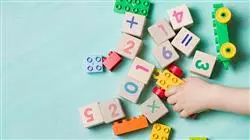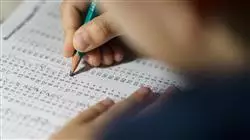University certificate
The world's largest faculty of education”
Introduction to the Program
A Postgraduate certificate that will allow you to teach Arithmetic of a natural number and Mental Calculus techniques in an efficient way to your students”

Since its beginnings in Ancient Greece, through rigor, mathematical demonstrations and its wide extrapolation to the different branches of science, numerous strategies have been developed to implement an effective method of study of mathematics. However, although it has evolved over the years and due to the complexity presented by the integration of its concepts and procedures, the objectives for which they were designed were not achieved. And this is where the current pedagogical innovation comes in, where the student is made an active participant in a dynamic and enriched environment to promote more efficient learning using the most fun tool: the game.
Therefore, it is essential to constantly update the specialized teacher in this subject and their communication skills in order to transmit knowledge efficiently, without losing an iota of rigor and gaining followers. For this reason, TECH has created this Postgraduate Certificate, to enable students to access a teaching that expands their competences when facing the difficulties and errors in the learning of mathematical operations in Pre-school Education.
All this, thanks to a 100% online methodology, which will enable the student to obtain an efficient learning thanks to the management of their study schedules as they wish. Likewise, the didactic contents that you will have in this qualification are elaborated by the best experts in Arithmetic, Algebra, Geometry and Measurement, so the knowledge that you will acquire will be completely applicable in your work experiences.
Learn in a dynamic environment, through collaborative activities and case studies offered by TECH in this exclusive Postgraduate certificate”
This Postgraduate certificate inArithmetic, Algebra, Geometry, and Measurement in Primary Education: Gamecontains the most complete and up-to-date educational program on the market. The most important features include:
- The development of practical cases presented by experts in Arithmetic, Algebra, Geometry and Measurement
- The graphic, schematic, and practical contents with which they are created, provide practical information on the disciplines that are essential for professional practice
- Practical exercises where the self-assessment process can be carried out to improve learning
- Its special emphasis on innovative methodologies
- Theoretical lessons, questions to the expert, debate forums on controversial topics, and individual reflection assignments
- Content that is accessible from any fixed or portable device with an Internet connection
Mathematics can be fun and you can transmit it through the tools you will acquire with thisPostgraduate certificate”
The program includes in its teaching staff professionals from the sector who bring to this program the experience of their work, as well as recognized specialists from leading societies and prestigious universities.
The multimedia content, developed with the latest educational technology, will provide the professional with situated and contextual learning, i.e., a simulated environment that will provide immersive education programmed to learn in real situations.
This program is designed around Problem-Based Learning, whereby the professional must try to solve the different professional practice situations that arise during the academic year For this purpose, the students will be assisted by an innovative interactive video system created by renowned and experienced experts.
Delve into the game as a strategy for logical-mathematical learning and become a specialized and dynamic teacher"

Invest in your education, acquire the necessary skills and abilities to update and improve your professional future"
Why study at TECH?
TECH is the world’s largest online university. With an impressive catalog of more than 14,000 university programs available in 11 languages, it is positioned as a leader in employability, with a 99% job placement rate. In addition, it relies on an enormous faculty of more than 6,000 professors of the highest international renown.

Study at the world's largest online university and guarantee your professional success. The future starts at TECH”
The world’s best online university according to FORBES
The prestigious Forbes magazine, specialized in business and finance, has highlighted TECH as “the world's best online university” This is what they have recently stated in an article in their digital edition in which they echo the success story of this institution, “thanks to the academic offer it provides, the selection of its teaching staff, and an innovative learning method aimed at educating the professionals of the future”
A revolutionary study method, a cutting-edge faculty and a practical focus: the key to TECH's success.
The most complete study plans on the university scene
TECH offers the most complete study plans on the university scene, with syllabuses that cover fundamental concepts and, at the same time, the main scientific advances in their specific scientific areas. In addition, these programs are continuously being updated to guarantee students the academic vanguard and the most in-demand professional skills. In this way, the university's qualifications provide its graduates with a significant advantage to propel their careers to success.
TECH offers the most comprehensive and intensive study plans on the current university scene.
A world-class teaching staff
TECH's teaching staff is made up of more than 6,000 professors with the highest international recognition. Professors, researchers and top executives of multinational companies, including Isaiah Covington, performance coach of the Boston Celtics; Magda Romanska, principal investigator at Harvard MetaLAB; Ignacio Wistumba, chairman of the department of translational molecular pathology at MD Anderson Cancer Center; and D.W. Pine, creative director of TIME magazine, among others.
Internationally renowned experts, specialized in different branches of Health, Technology, Communication and Business, form part of the TECH faculty.
A unique learning method
TECH is the first university to use Relearning in all its programs. It is the best online learning methodology, accredited with international teaching quality certifications, provided by prestigious educational agencies. In addition, this disruptive educational model is complemented with the “Case Method”, thereby setting up a unique online teaching strategy. Innovative teaching resources are also implemented, including detailed videos, infographics and interactive summaries.
TECH combines Relearning and the Case Method in all its university programs to guarantee excellent theoretical and practical learning, studying whenever and wherever you want.
The world's largest online university
TECH is the world’s largest online university. We are the largest educational institution, with the best and widest online educational catalog, one hundred percent online and covering the vast majority of areas of knowledge. We offer a large selection of our own degrees and accredited online undergraduate and postgraduate degrees. In total, more than 14,000 university degrees, in eleven different languages, make us the largest educational largest in the world.
TECH has the world's most extensive catalog of academic and official programs, available in more than 11 languages.
Google Premier Partner
The American technology giant has awarded TECH the Google Google Premier Partner badge. This award, which is only available to 3% of the world's companies, highlights the efficient, flexible and tailored experience that this university provides to students. The recognition as a Google Premier Partner not only accredits the maximum rigor, performance and investment in TECH's digital infrastructures, but also places this university as one of the world's leading technology companies.
Google has positioned TECH in the top 3% of the world's most important technology companies by awarding it its Google Premier Partner badge.
The official online university of the NBA
TECH is the official online university of the NBA. Thanks to our agreement with the biggest league in basketball, we offer our students exclusive university programs, as well as a wide variety of educational resources focused on the business of the league and other areas of the sports industry. Each program is made up of a uniquely designed syllabus and features exceptional guest hosts: professionals with a distinguished sports background who will offer their expertise on the most relevant topics.
TECH has been selected by the NBA, the world's top basketball league, as its official online university.
The top-rated university by its students
Students have positioned TECH as the world's top-rated university on the main review websites, with a highest rating of 4.9 out of 5, obtained from more than 1,000 reviews. These results consolidate TECH as the benchmark university institution at an international level, reflecting the excellence and positive impact of its educational model.” reflecting the excellence and positive impact of its educational model.”
TECH is the world’s top-rated university by its students.
Leaders in employability
TECH has managed to become the leading university in employability. 99% of its students obtain jobs in the academic field they have studied, within one year of completing any of the university's programs. A similar number achieve immediate career enhancement. All this thanks to a study methodology that bases its effectiveness on the acquisition of practical skills, which are absolutely necessary for professional development.
99% of TECH graduates find a job within a year of completing their studies.
Postgraduate Certificate in Arithmetic, Algebra, Geometry and Measurement in Primary Education. Play
Arithmetic, algebra, geometry and measurement are fundamental in Primary Education, as they provide the mathematical foundations necessary for problem solving and logical thinking. In this line, it is essential to have excellent methodologies to facilitate their effective learning in the youngest students. To this end, this academic institution has developed the Postgraduate Certificate in Arithmetic, Algebra, Geometry and Measurement in Primary Education. Play, a program that will enrich your teaching skills and raise the quality of the teaching of your classes. All this, completely online and from the comfort of your own home.
Specialize in this mathematical field and become a reference teacher
Through the Postgraduate Certificate in Arithmetic, Algebra, Geometry and Measurement in Elementary Education. Play, you will obtain a series of skills that will allow you to teach these disciplines with maximum efficiency. This way, you will learn to use games as a mechanism to promote the learning of Mathematics, you will identify the best techniques to perform mental arithmetic or assimilate the strategies to handle the difficulties derived from the teaching of statistics and probability. Do not miss this opportunity and grow professionally thanks to this degree, studying the most avant-garde didactic materials of the pedagogical panorama!







